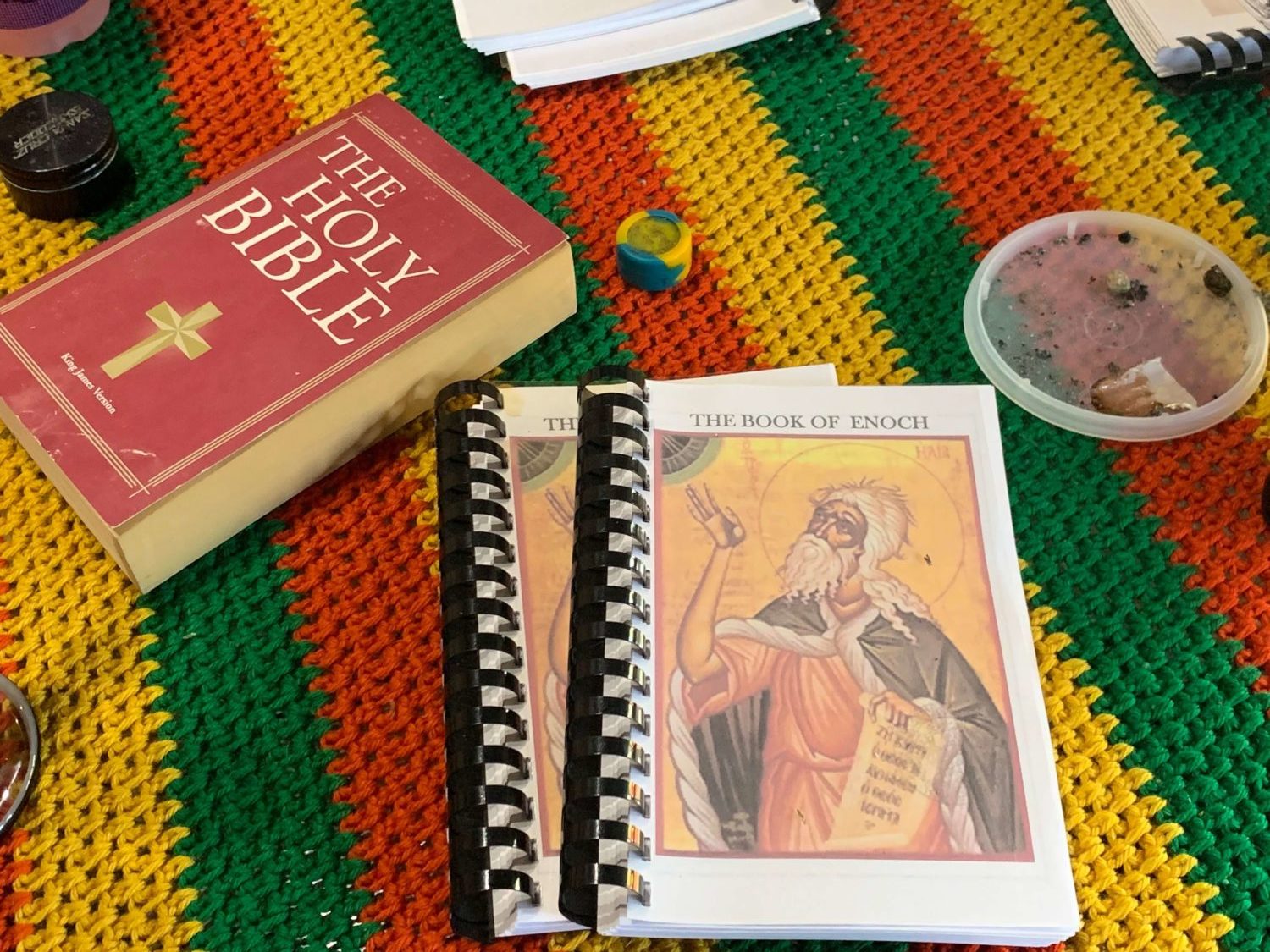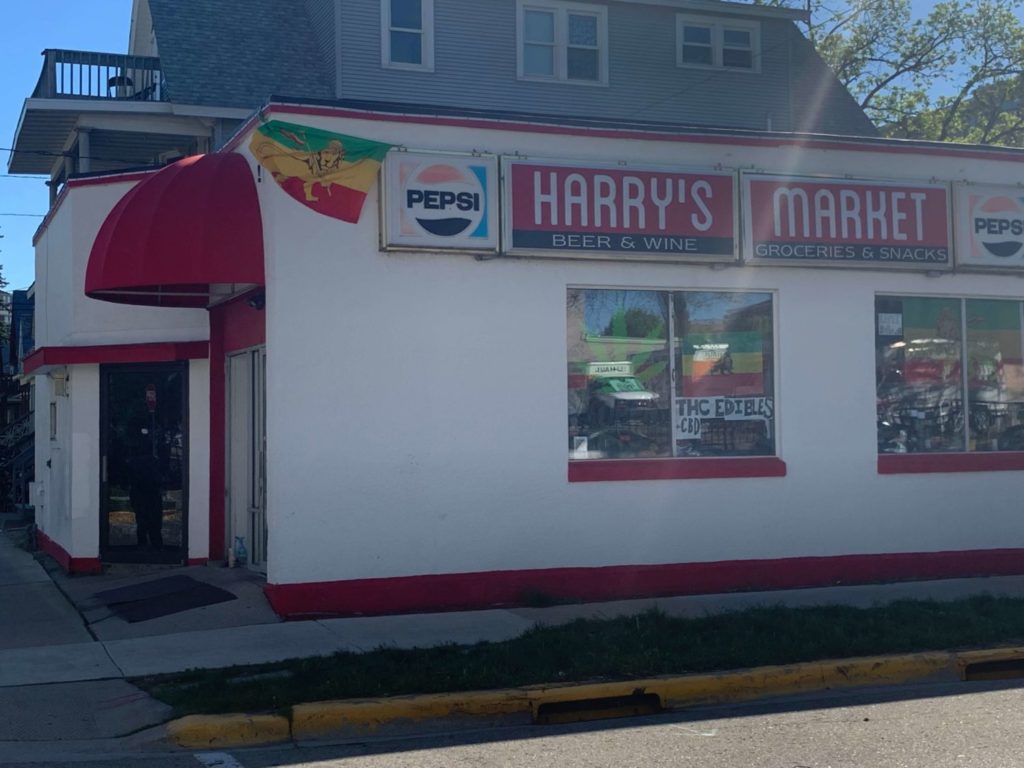
Ever since the Lion of Judah, House of Rastafari became recognized as a “church” earlier this year, they have certainly been causing a stir in the Madison community.
Founder Jesse Schworck has claimed the legal right to sell marijuana as a sacrament — though he would say he only gives it away for sincere religious use in exchange for a donation.
But some in the community have understandably wondered how authentic they truly are and have accused them of appropriating Black culture while also exercising white privilege, running a cannabis operation out in the open without being arrested while many people of color sit in jail for the same offense.
Walking into their Mifflin Street headquarters, after being asked to provide a membership card at the door, one might observe some literature about Ethiopian history, religious manuscripts and, well, plenty of cannabis and drug paraphernalia. (The membership is free and only requires a signature on the back of a business card.)
The Rastafarians behind House of Judah, Schworck and Dylan Bangert, are white, sporting long dreadlocks and accents that sound vaguely Jamaican.
Schworck, 39, said that he grew up around Madison but his persona and accent are genuinely him. Asked where his accent comes from, he initially blamed the Invisalign tooth aligners he had in, but even after he removed them, the accent remained.
“I don’t really see myself as having an accent but a lot of people apparently have told me over my life that when they talked to me on a phone or something, they think that I’m black or something,” he told Madison365. “So whatever they’re hearing is just me. Nobody else can talk like this. No one else can do what I do because it’s just me. It comes natural for me because this is my life.”
In a wide-ranging, sometimes rambling interview during which he continually smoked a joint, Schworck told Madison365 that he is not appropriating Black culture, but that he is “black-hearted.”
“I know that I’m not a white man,” he said. “I’m not a white person. And you can sit and do all of these labeling games, everybody is mixed with black people.
“Black-hearted means that you hate white supremacy,” Schworck said. “For the last 20 years, me, personally, have been traveling to Jamaica over a dozen times, to Kenya over a dozen times. Me, personally, going over there and spending my money, my time, my life, my resources and to go over there and take interest in things that people should be interested in. Like origins of Christianity and the origin of Judaism. It’s not my fault that I happen to be the light for many people to go look into this themselves. It’s not my fault. So if nobody else was black-hearted enough to do it but me, that’s what it is. They have some other thing on their mind and it’s definitely not any black-hearted people that would be against me.”
Schworck also said his church is using its proceeds to support communities of color, but couldn’t name anything specific the church had done or donated to, other than introducing a Black man whom he had helped to find a job two days earlier.
He did say, however, he intended to go to Africa to buy slaves.
“We want to do like certain fundraisers that we can take the money and use money to go buy slaves,” he said. “So we want to get a big, huge, bigger money and go buy slaves somewhere. Anybody ever do that before? Do you see any churches doing that? What we want to do with the slaves, we want to go buy the slaves and then we want to go free the slaves and go send them back to their countries. Go, somehow get into the market, different slave markets, whether it’d be Libya or other places and spend our money to go over there and actually free people from their circumstances in one way or the other. That’s something realistic we can do.”
Schworck also said the church isn’t just a front for a cannabis operation, because the cannabis is just a small part of what they do, though he couldn’t name any other specific social or religious activities that take place there beyond “brothers and sisters here that have good reasoning and that have good spirit to come together to help resolve a lot of issues and reason on these things together where two or more are gathered.”

Problematic Social Media
Wandering through the House of Rastafari Facebook page appears to show a less tolerant picture.
On their Facebook page, for example, was a now-deleted post of the late Steve Irwin, the Australian wildlife guru, dangling a picture of a black woman.
“Here we have a wild hoodrat” the post says. “Once a hoodrat reaches sexual maturity, she will begin a mating dance known as ‘twerking’ to find a mate to supply her with food and shelter.”

They have postings against homosexuality, as well. In one post is an outline of a man and woman holding hands with the words “Straight Pride” underneath it. This and similar posts inspired a protest of about 20 people outside the shop on Wednesday.
“I don’t see what the controversy is,” Schworck said. “You know, we’re proud to be a created the way we are. We are procreators. We’re not people that caused the earth to die off. We are people that make opposites attract in a natural harmony, we’re people that are balanced. … That’s who we are. We’re very proud of those things. And we’re not sitting here like playing in each other’s poop or, or playing into others dirty liquids in their body. We’re not playing, we’re not playing dirty games. So just sitting here trying to be good people. So whatever it is, it’s not, we’re trying to be clean people and procreators. So you can’t be mad at us for what we’re doing.”
A Confrontation
The use of homophobic language and misogynistic postings was the cause of a confrontation the recently with community activist Dana Pellebon, who called them out on their online postings. Pellebon is a proud mixed-race member of the LGBTQ community and had a problem with what she called degrading Facebook and online postings.
Pellebon posted a video on Facebook that shows members of the House of Judah physically grabbing and shoving her because she questioned why they continue to engage in racist and sexist behavior, as well as homophobic rhetoric. The video shows one member of the group shoving her until she was close to the exit door.
Pellebon’s video is below. Some may find it upsetting.
The incident began when Pellebon had on online confrontation with Schworck because she felt it was inappropriate for them to continue appropriating a culture that was not their own and using it to sell marijuana at a time when minority incarceration numbers are disproportionately high owing mostly to drug arrests.
“He wouldn’t stop,” Pellebon told Madison365. “I got angrier because black men are by far jailed in astonishing numbers because of marijuana and these guys are selling it right there. And so I went in there.”
Pellebon had told them she would come speak to them in person about their disagreement but says that when she first arrived they didn’t appear to know who she was. She told Madison365 they thought she was just there to join their church and buy weed until she asked to speak to one of the owners.
Pellebon says one of the White Rastas told her she wasn’t truly black because she is light skinned and called her a Neanderthal. Pellebon refused to take an insult like that and stepped towards the man. At that point, a black man began to grab Pellebon.
“He’s lucky that I feel very strongly about calling the police on black men if I don’t have to and I know the only thing that would happen is another black man in jail,” Pellebon said. “But I want it very clear he put his hands on me and pushed me out of the building. While two white men (who were there buying drugs) were standing there and allowed it to happen because drugs are more important than actual morality. You have a ‘church’ full of white men who are being homophobic, racist, misogynistic, posting memes about black women and we’re supposed to just be okay with that.”
Schworck saw the incident differently.
“We have a Jamaican brother over here that ran this lady out of here because she came in here real rude,” Schworck told Madison365. “And angry and argumentative, immediately accusatory. And then she found a Jamaican Rasta brother in here that was not having any of that s–t and he removed her out of here because of it. … That lady came here when she first walked in accusing and yelling at everybody about cultural appropriation. She doesn’t even know her own culture. If she did, she’d be a Rastafari.”
Pellebon said even after the incident, the men refused to take any responsibility and posted on one of her friend’s page their version of the incident. They said Pellebon came in “drunk” (which she was not) and then they misgendered her calling her an “it”. They said she came in there talking about hating white people (despite them posting extremely racist anti-black things publicly).
Pellebon didn’t expect her discussion with the White Rastas to be anything more than a heated exchange and certainly did not expect to be assailed physically. She went because she feels like it is about time someone in Madison stood up and did something about issues rather than just talk about them.
“What I’m hoping comes out of it is that I’m hoping no one goes there to buy weed. They’re feigning a religion,” she said. “The police have been there. There’s articles about it in the (local media), I believe. So what I want is people to stop going there and stop giving them money because what they’re giving money to is harmful. They’re profiting off of black bodies. Not okay! I don’t mind putting myself in those positions to expose them because people know who I am. And they pissed me off, so I went there.”
Madison365 attempted to get a statement from the City of Madison as well as the Madison Police Department about whether a religious institution can, in fact, serve cannabis legally. Police Spokesperson Joel Despain referred Madison365 to the City Attorney’s office. City Attorney Michael May said in a message that he was unable to comment on the Lion of Judah, House of Rastafari, due to an ongoing investigation.
The legalization of marijuana has been a topic of political discussion around Madison for some time. In November’s election, marijuana legalization referendums passed in over a dozen counties statewide. Governor Tony Evers has said publicly that he would support the legalization of medical marijuana in Wisconsin. He also has supported the movement to decriminalize small amounts of possession, which would directly impact minority incarceration numbers in Wisconsin. Republican legislative leaders, however, have not been open to those measures.
In the meantime, Lion of Judah continues to sell cannabis — or, rather, provide sacrament in exchange for donations — without consequence, though they acknowledge they can’t offer any protection for anyone who buys marijuana from them and takes it outside their building, except to offer a membership card one could show in court.
“I’m not going to sit here and be the liability for anybody,” Schworck said. “We’re at least giving people a way so that if the police, maybe will or would not respect your (church member) identification in your car when you showed them. However, when you go into court, you can present it to an attorney, a judge, a jury, and then we’ll see.”



